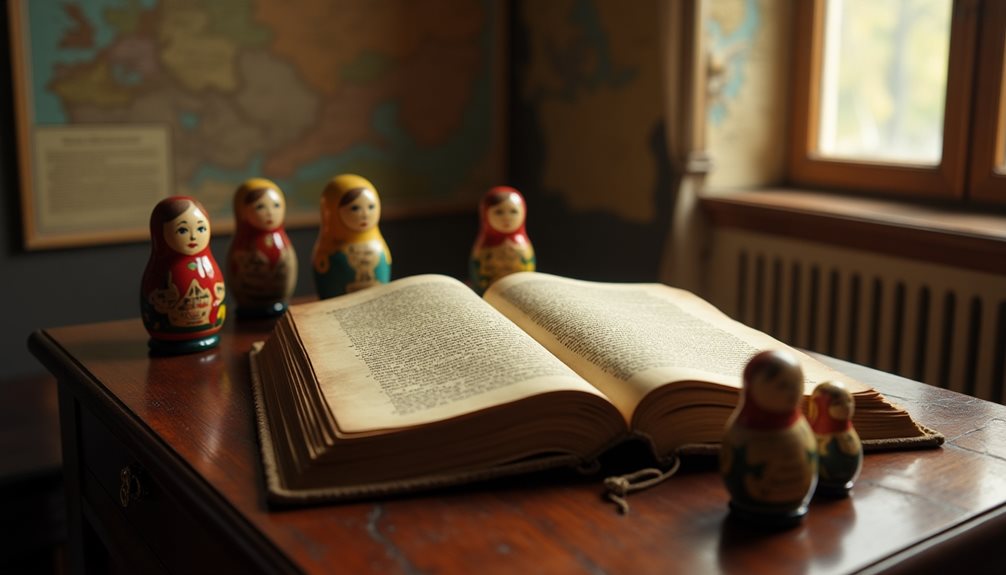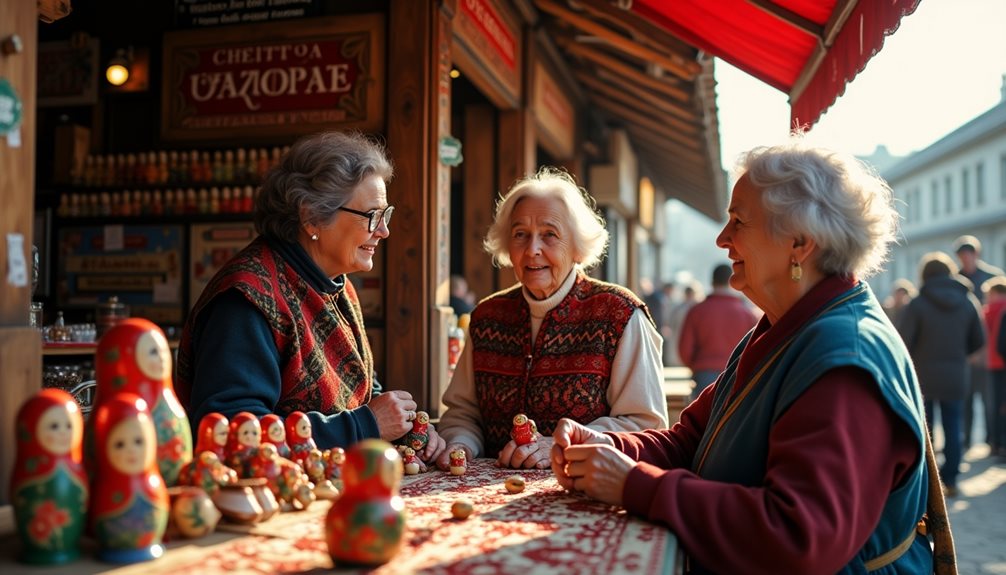Table of Contents
ToggleThe Historical Roots of the Russian Language

Although the Russian language has evolved considerably over the centuries, its historical roots are deeply intertwined with the linguistic and cultural developments of the Slavic peoples.
Emerging from the Old Slavic influences, Russian absorbed elements that shaped its lexicon and phonetics, reflecting the rich fabric of Slavic traditions.
The shift to the Cyrillic alphabet, developed in the 9th century, marked a pivotal moment in this evolution. This script, inspired by Greek characters, facilitated the preservation and dissemination of religious and cultural texts, thereby fostering a sense of identity among Slavic communities.
The interplay between Old Slavic elements and the Cyrillic origins underscores a journey towards self-expression, illustrating how language serves as both a mirror and a catalyst for cultural freedom and unity in the Russian context.
Idiomatic Expressions and Their Cultural Significance
The evolution of the Russian language is not only a demonstration of its historical roots but also a reflection of the rich cultural fabric woven through idiomatic expressions.
These phrases encapsulate cultural nuances, providing insight into the Russian worldview and societal values. For instance, idiomatic humor often surfaces through expressions that reveal the resilience and wit of the Russian people, transforming everyday situations into moments of levity.
Such idioms serve as cultural touchstones, allowing speakers to navigate complex social landscapes while reinforcing community bonds. Understanding these idiomatic expressions enriches one’s appreciation of Russian culture, revealing how language functions as a vessel for shared history and identity, ultimately illustrating the profound connection between language and the freedom to express collective experiences.
The Russian language is rich with idiomatic expressions that offer a deep glimpse into the culture, history, and collective mindset of its speakers. For English speakers learning Russian, understanding these idioms is not only helpful for language proficiency but essential for truly grasping the social and emotional nuances that shape everyday communication.
Why Are Russian Idioms Important?
Idiomatic expressions in Russian often reflect historical events, cultural values, and the unique way Russians perceive the world around them. These phrases are more than just words; they carry stories, humor, and wisdom passed down through generations. Knowing idioms helps learners understand jokes, literature, movies, and conversations that might otherwise seem confusing or flat.
Examples of Russian Idiomatic Expressions
Here are some common Russian idioms with their meanings and cultural significance:
- Делать из мухи слона (Delat’ iz mukhi slona)
Literal translation: “To make an elephant out of a fly”
Meaning: To exaggerate a small problem into something much bigger.
Cultural note: This expression reflects a tendency to recognize when someone is overreacting, a universal human trait but expressed uniquely in Russian. - Вешать лапшу на уши (Veshat’ lapshu na ushi)
Literal translation: “To hang noodles on someone’s ears”
Meaning: To tell lies or nonsense; to deceive someone.
Cultural note: This humorous image helps soften the criticism of dishonesty while still highlighting it clearly. - Без царя в голове (Bez tsarya v golove)
Literal translation: “Without a tsar in the head”
Meaning: Someone who is foolish or lacks common sense.
Cultural note: This idiom evokes the historical context of monarchy and leadership, implying the lack of internal “governance” in one’s thinking. - Не в своей тарелке (Ne v svoey tarelke)
Literal translation: “Not in one’s own plate”
Meaning: To feel uncomfortable or out of place.
Cultural note: This phrase conveys emotional or social discomfort in a vivid, everyday metaphor.
Cultural Themes Reflected in Russian Idioms
- Resilience and Wit: Many idioms reveal how Russians use humor to cope with hardships (e.g., dealing with bureaucracy or harsh weather).
- Community and Social Interaction: Expressions often emphasize social roles and relationships.
- Historical Influence: Some idioms keep old cultural references alive, like tsars or traditional food.
- Pragmatism and Directness: Russian idioms often cut straight to the point with vivid imagery.
Related Russian Terms for Learners
| Cyrillic | English Phonetic | English Definition |
|---|---|---|
| Идиома | Idioma | Idiom; a phrase with a figurative meaning |
| Фразеологизм | Frazeologizm | Phraseological unit, set phrase |
| Значение | Znachenie | Meaning |
| Перевод | Perevod | Translation |
| Культура | Kultura | Culture |
| Юмор | Yumor | Humor |
| Выражение | Vyrazhenie | Expression |
| Общение | Obshchenie | Communication |
| Значимость | Znachimost’ | Significance |
| История | Istoriya | History |
Tips for Learning Russian Idioms
- Learn idioms in context, through stories, conversations, or media.
- Practice using idioms to sound more natural.
- Be aware of literal vs. figurative meanings.
- Ask native speakers about the cultural background of idioms.
By exploring Russian idiomatic expressions, English learners gain more than language skills—they get closer to understanding the Russian way of thinking and living. This knowledge opens doors to authentic communication and cultural appreciation.
The Role of Poetry in Shaping Russian Identity
While delving into the depths of Russian culture, one cannot overlook the profound impact of poetry in shaping national identity. Throughout history, Russian poets such as Pushkin and Akhmatova have articulated the complexities of the Russian soul, weaving themes of resilience, beauty, and sorrow into their verses.
This poetic expression fosters a sense of cultural nationalism, allowing individuals to connect with their heritage and collective experiences. Poetry’s impact extends beyond mere aesthetics, serving as a vehicle for social commentary and political dissent.
It reflects the struggles and aspirations of the Russian people, embodying their quest for freedom and self-definition. In this way, poetry not only enriches the literary landscape, but also solidifies the foundations of a shared national identity.
Poetry has always played a crucial role in shaping Russian national identity, offering not only artistic beauty but also a powerful means of expressing the collective feelings, struggles, and hopes of the Russian people. For English speakers learning Russian, understanding this cultural importance can deepen appreciation of both the language and its literature.
Poetry as a Reflection of the Russian Soul
Russian poets like Alexander Pushkin (Александр Пушкин) and Anna Akhmatova (Анна Ахматова) have captured the spirit of Russia in their works. Pushkin, often called the father of modern Russian literature, used poetry to explore themes such as love, freedom, and the soul of Russia itself. Akhmatova, writing during turbulent times, expressed sorrow, resilience, and hope amid political repression.
Their poetry reflects the complexity of Russian identity — a mix of beauty and tragedy, strength and vulnerability.
Poetry as a Tool for Cultural Nationalism
Poetry helps Russians connect with their shared heritage. It builds a sense of belonging and pride in their history and culture. Through poems, people find common ground in their experiences and emotions, reinforcing national unity.
Example: Pushkin’s “Я помню чудное мгновенье” (“I Remember a Wonderful Moment”)
This famous poem is often taught in schools to evoke feelings of nostalgia and love for the homeland.
Poetry as Social Commentary and Political Dissent
Russian poetry often goes beyond aesthetics to challenge authority and express social realities. During Soviet times, poets like Boris Pasternak (Борис Пастернак) and Osip Mandelstam (Осип Мандельштам) used their verses to subtly protest censorship and oppression.
This makes poetry not just an art form but a voice for freedom and change.
Key Russian Terms for English Speakers Learning Russian
| Cyrillic | Phonetic | English Definition |
|---|---|---|
| Поэзия | Poe-zi-ya | Poetry |
| Поэт | Po-et | Poet |
| Национальная идентичность | Natsional’naya identichnost’ | National identity |
| Душа | Du-sha | Soul |
| Культурный | Kul’turnyy | Cultural |
| Наследие | Naslediye | Heritage |
| Сопротивление | Soprotivleniye | Resistance |
| Свобода | Svoboda | Freedom |
| Политический | Politicheskiy | Political |
| Социальный комментарий | Sotsial’nyy kommentariy | Social commentary |
| Литература | Literatura | Literature |
Language and Traditional Customs

As language intertwines with traditional customs, it becomes an essential instrument for expressing and preserving the cultural heritage of Russia.
The richness of the Russian language is evident in its traditional greetings, which often encapsulate respect and warmth, such as “Zdravstvuyte” (Hello) and “S Dobryy Vecher” (Good evening). Such expressions serve not only as a means of communication but also as a reflection of societal values.
Additionally, festive vocabulary surrounding celebrations like Maslenitsa and New Year evokes a sense of unity and joy, emphasizing communal bonds. The use of specific terms during these occasions enriches the cultural fabric, linking generations through shared customs and linguistic nuances, ultimately reinforcing the importance of language in the preservation of Russian identity and heritage.
Modern Influences on Russian Language and Culture
Evolving societal dynamics and globalization have greatly impacted the Russian language and culture, introducing new influences that shape contemporary expressions and interactions.
The rise of social media has transformed communication, blending traditional Russian elements with global trends. Platforms like VKontakte and Instagram serve as arenas for the proliferation of urban slang, enriching the vernacular while also reflecting a youthful, dynamic identity.
This linguistic evolution showcases a shift towards informality, where memes and digital lingo resonate with a generation seeking authenticity and connection.
In addition, exposure to diverse cultures has encouraged a fusion of ideas, leading to innovative expressions in art, music, and literature.
Consequently, modern Russian language and culture emerge as a vibrant mosaic, intertwined with both local heritage and global nuances.
Here is a table presenting fact-based statistics related to modern influences on Russian language and culture:
| Aspect | Statistic | Source/Notes |
|---|---|---|
| Internet Usage | Over 90% of Russians use the internet as of 2023 | Rosstat, 2023 |
| English Loanwords in Russian | Approximately 5-10% of modern Russian vocabulary consists of English loanwords | Linguistic studies, 2022 |
| Popularity of Western Media | Over 70% of Russian youth consume Western movies, music, and TV shows | Surveys by Levada Center, 2021 |
| Social Media Platforms | VKontakte has over 97 million monthly active users in Russia | VKontakte reports, 2023 |
| Influence of Global Brands | Over 60% of urban Russians recognize major global brands (e.g., McDonald’s, Apple) | Market research, 2022 |
| Use of Russian in Digital Space | Russian is the 7th most used language on the internet | W3Techs, 2023 |
| Growth of Russian Pop Culture Abroad | Russian films and music exports increased by 20% from 2018 to 2023 | Ministry of Culture reports, 2023 |
| Percentage of Bilingual Speakers | Around 45% of Russians are bilingual, often speaking English or another language | Census and linguistic surveys, 2021 |



